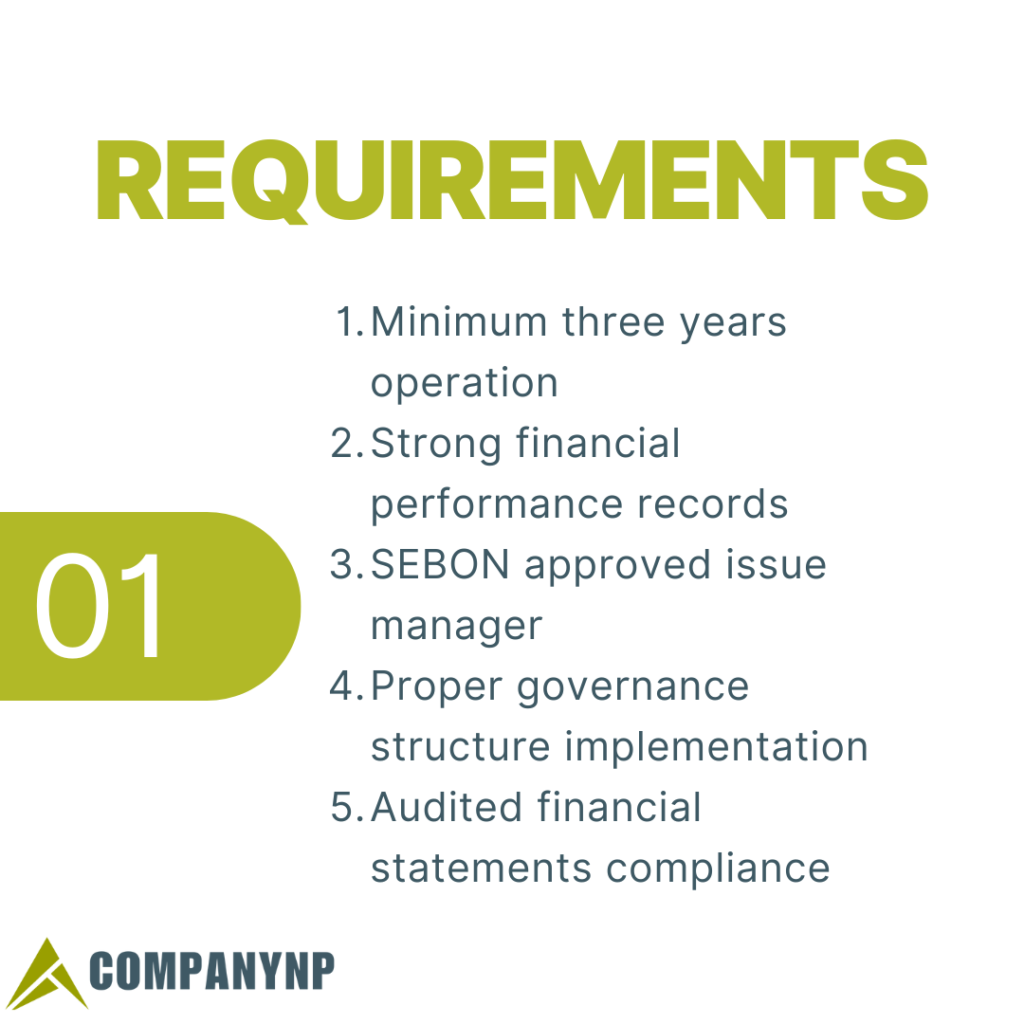Introduction
Initial Public Offerings (IPOs) play a crucial role in Nepal’s capital market, providing companies with access to public funds and offering investors opportunities to participate in corporate growth. This comprehensive guide delves into the intricacies of IPO law in Nepal, covering legal frameworks, procedures, requirements, and current practices.
What is an IPO?
An Initial Public Offering (IPO) is the process by which a private company offers its shares to the public for the first time. In Nepal, IPOs are governed by the Securities Act, 2063 (2007) and various regulations issued by the Securities Board of Nepal (SEBON). The primary objective of an IPO is to raise capital for company expansion, debt repayment, or other corporate purposes while transitioning from a private to a public entity.
Requirements for Initial Public Offering in Nepal
To initiate an IPO in Nepal, companies must meet specific criteria set forth by SEBON and other regulatory bodies. These requirements include:
- Minimum paid-up capital: As per the Securities Registration and Issue Regulation, 2073 (2016), the company must have a minimum paid-up capital of NPR 100 million for manufacturing companies and NPR 50 million for other companies.
- Operational history: The company should have been in operation for at least three years and have positive net worth.
- Profitability: The company must have earned net profit for at least three years out of the last five years.
- Corporate governance: The company should comply with corporate governance standards as prescribed by the Company Act, 2063 (2006) and SEBON regulations.
- Audited financial statements: The company must have audited financial statements for at least three years.
- Credit rating: A credit rating from a SEBON-approved credit rating agency is mandatory for companies planning an IPO.
II. Legal Framework for IPOs in Nepal
The legal framework governing IPOs in Nepal is primarily based on the following laws and regulations:
- Securities Act, 2063 (2007): This act provides the fundamental legal basis for securities issuance and trading in Nepal.
- Securities Registration and Issue Regulation, 2073 (2016): This regulation outlines specific requirements and procedures for securities registration and issuance, including IPOs.
- Company Act, 2063 (2006): This act governs the formation, operation, and dissolution of companies in Nepal, including provisions related to public offerings.
- Securities Board of Nepal Act, 2063 (2007): This act establishes SEBON as the primary regulatory authority for the securities market in Nepal.
- Securities Businessperson (Merchant Banker) Regulations, 2064 (2008): These regulations govern the activities of merchant bankers, who play a crucial role in the IPO process.
- Securities Listing and Trading Regulations, 2075 (2018): These regulations outline the requirements and procedures for listing and trading securities on the Nepal Stock Exchange (NEPSE).
III. IPO Issuance Procedure in Nepal
The IPO issuance procedure in Nepal involves several steps, each governed by specific legal requirements and regulatory oversight.
A. Step 1: Company Preparation and Due Diligence
Before initiating the IPO process, the company must ensure it meets all legal and regulatory requirements. This includes:
- Conducting a thorough internal audit
- Preparing audited financial statements
- Ensuring compliance with corporate governance standards
- Obtaining necessary approvals from the company’s board of directors and shareholders
B. Step 2: Appointment of Issue Manager
The company must appoint a SEBON-licensed issue manager (merchant banker) to oversee the IPO process. The issue manager’s responsibilities include:
- Conducting due diligence on the company
- Preparing the IPO prospectus
- Liaising with SEBON and other regulatory bodies
- Managing the IPO subscription process
C. Step 3: SEBON Application and Approval
The issue manager, on behalf of the company, submits an application to SEBON for IPO approval. This application must include:
- Draft prospectus
- Audited financial statements
- Credit rating report
- Due diligence report
- Other required documents as specified in the Securities Registration and Issue Regulation, 2073 (2016)
SEBON reviews the application and may request additional information or clarifications. Upon satisfaction, SEBON grants approval for the IPO.
D. Step 4: Prospectus Publication and Subscription
Following SEBON approval, the company must:
- Publish the approved prospectus in national newspapers
- Open the IPO for public subscription
- Manage the subscription process through designated collection centers
The subscription period typically lasts for 4-5 days, as specified in the Securities Registration and Issue Regulation, 2073 (2016).
E. Step 5: Allotment and Listing
After the subscription period closes, the company must:
- Allot shares to successful applicants as per SEBON guidelines
- Refund excess subscription amounts
- Apply for listing on the Nepal Stock Exchange (NEPSE)
- Comply with NEPSE listing requirements and ongoing disclosure obligations
IV. Required Documents for IPO
Companies planning an IPO in Nepal must prepare and submit various documents, including:
- Memorandum and Articles of Association
- Board resolution approving the IPO
- Shareholders’ resolution authorizing the IPO
- Audited financial statements for the past three years
- Due diligence report from the issue manager
- Credit rating report
- Draft prospectus
- Underwriting agreement (if applicable)
- Legal opinion on the company’s compliance with relevant laws
- Tax clearance certificates
- Other documents as required by SEBON and NEPSE
V. IPO Consulting Services
Professional IPO consulting services in Nepal typically include:
- Pre-IPO assessment and readiness evaluation
- Assistance in meeting regulatory requirements
- Guidance on corporate restructuring (if necessary)
- Support in preparing required documents
- Liaison with regulatory authorities
- Management of the IPO process
- Post-IPO compliance advisory
VI. Typical Timeline for IPO Process
The IPO process in Nepal typically takes 6-12 months, depending on the company’s readiness and regulatory approvals. Key milestones include:
- Pre-IPO preparation: 2-3 months
- Appointment of issue manager and document preparation: 1-2 months
- SEBON application and approval: 2-3 months
- Prospectus publication and subscription: 1 month
- Allotment and listing: 1-2 months
VII. Costs Associated with IPOs
The costs of conducting an IPO in Nepal may include:
- Issue manager fees
- Underwriting fees (if applicable)
- Legal and auditing fees
- Credit rating agency fees
- SEBON registration fees
- NEPSE listing fees
- Advertising and marketing expenses
- Printing and distribution costs for the prospectus
These costs can vary significantly depending on the size and complexity of the IPO.
Property Rights of Daughters in Nepal | Arbitration in Construction Disputes in Nepal | Annual General Meeting Process in Nepal
VIII. Relevant Securities Laws and Authorities
Key laws and authorities governing IPOs in Nepal include:
- Securities Act, 2063 (2007)
- Company Act, 2063 (2006)
- Securities Board of Nepal Act, 2063 (2007)
- Securities Registration and Issue Regulation, 2073 (2016)
- Securities Board of Nepal (SEBON)
- Nepal Stock Exchange (NEPSE)
- Office of the Company Registrar
IX. Current IPO Practices in Nepal
Recent trends in Nepal’s IPO market include:
- Increased focus on corporate governance and transparency
- Growing interest in IPOs from the technology and renewable energy sectors
- Introduction of book-building mechanism for pricing IPOs
- Enhanced use of digital platforms for IPO subscriptions
- Increased participation from institutional investors
X. Conclusion
Initial Public Offerings in Nepal are governed by a comprehensive legal framework that aims to protect investors while facilitating capital formation. Companies considering an IPO must navigate complex regulatory requirements and market dynamics. Professional guidance from experienced issue managers and legal advisors is crucial for a successful IPO process.
As Nepal’s capital market continues to evolve, it is essential for companies and investors to stay informed about the latest regulatory developments and market practices related to IPOs.
FAQs
Who regulates IPOs in Nepal?
The Securities Board of Nepal (SEBON) is the primary regulatory authority for IPOs in Nepal, working in conjunction with the Nepal Stock Exchange (NEPSE) and the Office of the Company Registrar.
What’s the minimum company size for an IPO?
As per current regulations, manufacturing companies must have a minimum paid-up capital of NPR 100 million, while other companies require NPR 50 million to be eligible for an IPO.
How long does the IPO process typically take?
The IPO process in Nepal typically takes 6-12 months from initial preparation to final listing on the stock exchange.
Can foreign investors participate in Nepali IPOs?
Yes, foreign investors can participate in Nepali IPOs, subject to certain restrictions and regulations set by the Nepal Rastra Bank and SEBON.
What’s the typical IPO size in Nepal?
IPO sizes in Nepal vary widely depending on the company and sector. Recent IPOs have ranged from NPR 100 million to several billion Nepali Rupees.
How is IPO pricing determined?
IPO pricing in Nepal is typically determined through fixed pricing or book-building methods, as approved by SEBON. The pricing must be justified based on the company’s financial performance and market conditions.
Can companies list directly without an IPO?
In certain cases, companies may be eligible for direct listing on NEPSE without going through the IPO process. However, this is subject to specific regulatory requirements and SEBON approval.
Contents
- 1 Introduction
- 2 What is an IPO?
- 3 Requirements for Initial Public Offering in Nepal
- 4 II. Legal Framework for IPOs in Nepal
- 5 III. IPO Issuance Procedure in Nepal
- 6 IV. Required Documents for IPO
- 7 V. IPO Consulting Services
- 8 VI. Typical Timeline for IPO Process
- 9 VII. Costs Associated with IPOs
- 10 VIII. Relevant Securities Laws and Authorities
- 11 IX. Current IPO Practices in Nepal
- 12 X. Conclusion
- 13 FAQs








